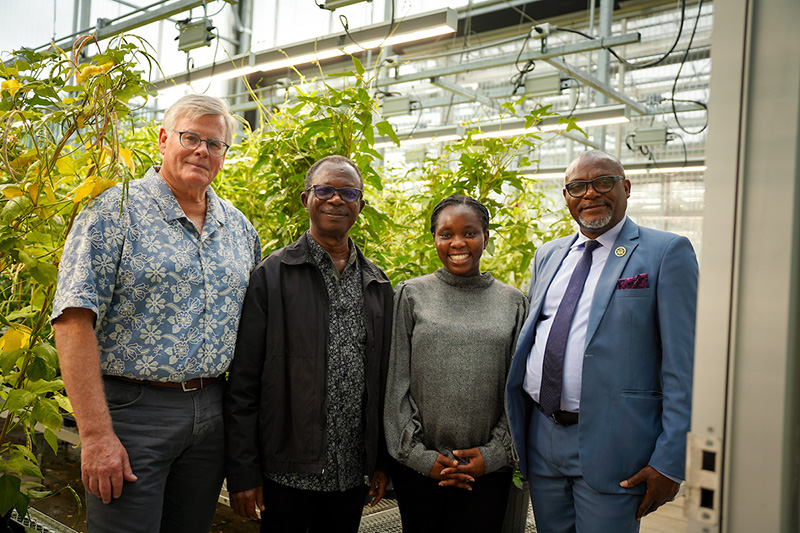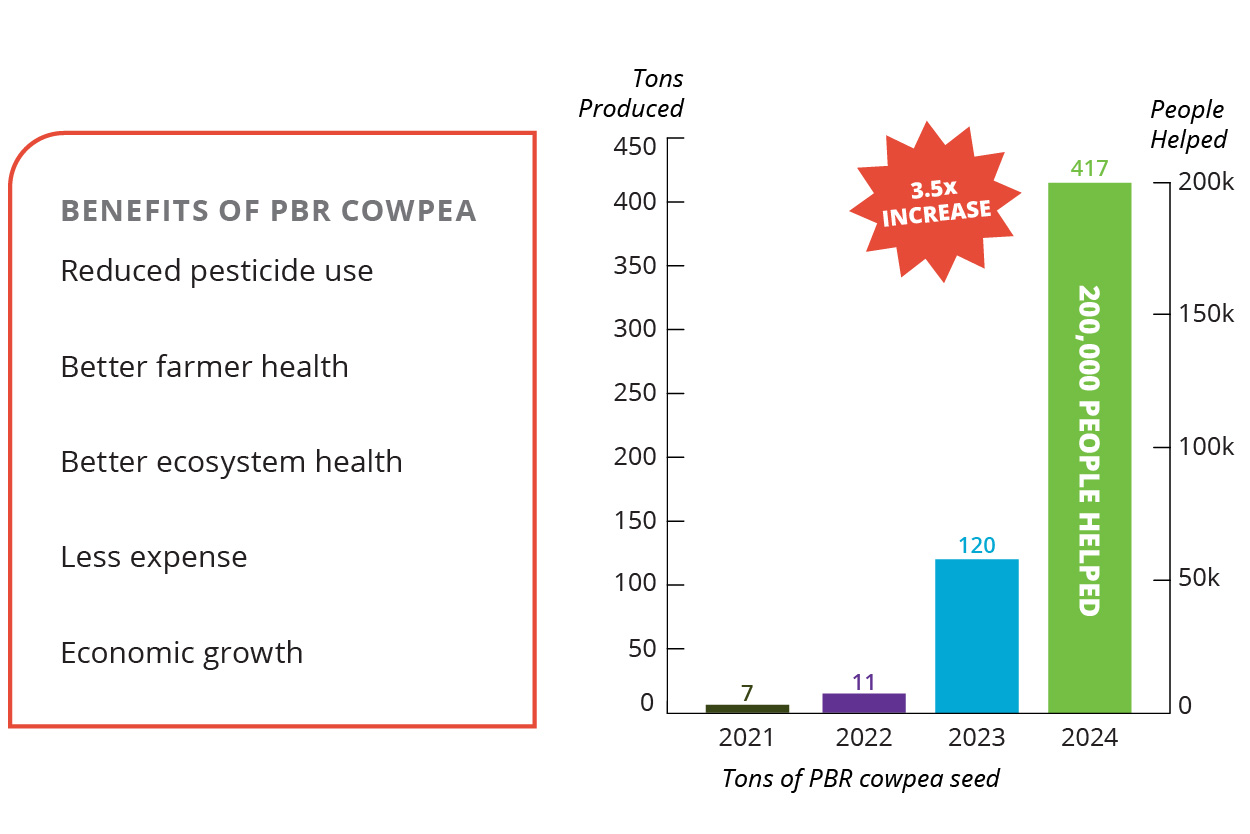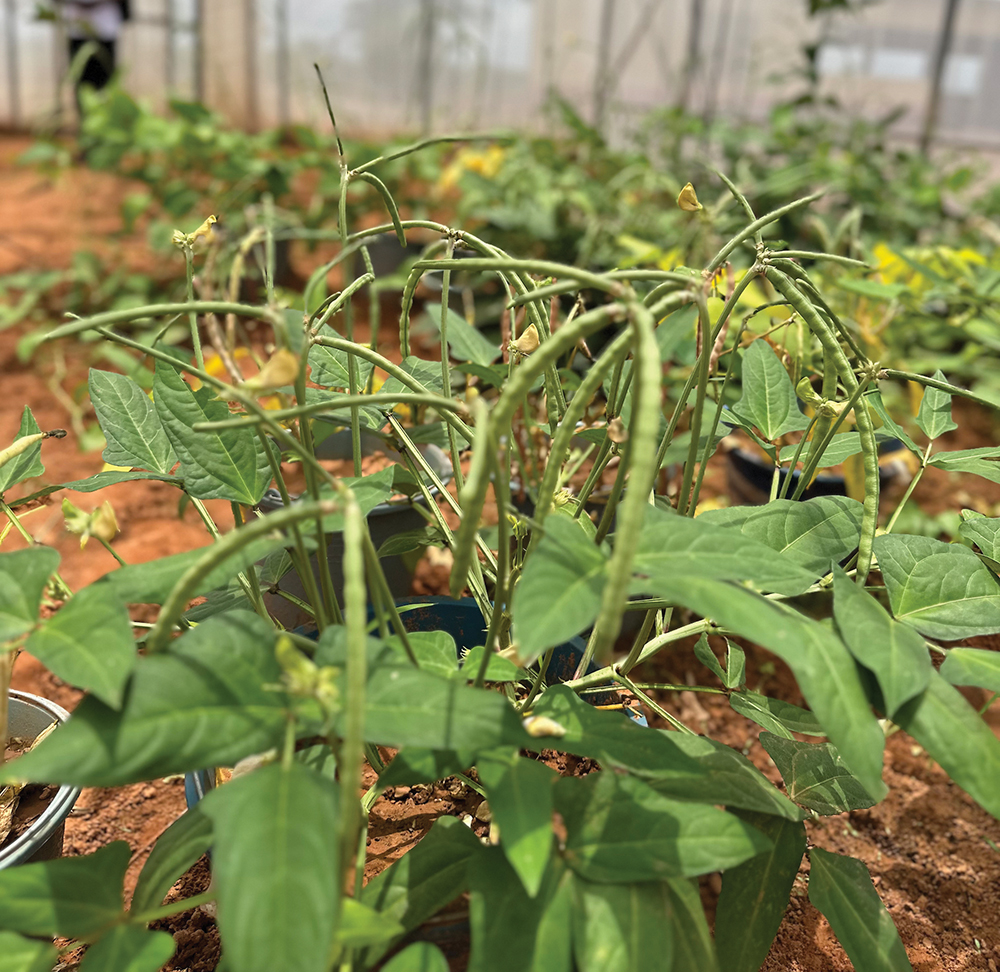Ghana Achieves Milestone: Celebrating PBR Cowpea Expansion
In July 2024, Ghana marked a significant advancement in agricultural biotechnology with the commercial release of its first genetically modified crop: the pod borer resistant (PBR) cowpea. The Danforth Center Institute for International Crop Improvement (IICI) has played a pivotal role in the crop’s approval and dissemination. This development promises to enhance food security and improve the lives of farmers across the nation.

Farmers celebrating the release of pod borer resistant cowpea seeds this July in Nyankpala, northern Ghana. Ghana has joined Nigeria in adopting this improved crop. (Courtesy CSIR-SARI)
A Staple, A Challenge
Cowpea, also known as black-eyed pea, serves as a critical protein source for more than 200 million people in sub-Saharan Africa, particularly in West Africa, where it holds a cherished place in daily life and culture. In this region, cowpea is affectionately referred to as simply "beans," reflecting its ubiquity in households and markets. Its versatility shines in a variety of beloved dishes, from savory red-red stew in Ghana to akara (bean fritters) and moi moi (bean pudding) in Nigeria. As a staple crop, cowpea not only provides essential nutrition but also plays a vital role in the region’s economy, offering livelihood opportunities for millions of smallholder farmers.
However, the cultivation of cowpeas has been severely hindered by the pod borer pest (Maruca vitrata), which can devastate yields by boring into pods. Traditional methods to combat this pest— including a pesticide spraying regimen of 10x per season—have proven unhealthy, expensive, and inadequate, leading to substantial losses for farmers. Conventional breeding has not been able to produce a resistant variety. Ghana currently imports cowpeas from neighboring Niger, Mali, and Nigeria. Officials hope with the adoption of PBR cowpea that Ghanaian farmers can increase their production and become self-sufficient.

CEO of Ghana’s National Biosafety Authority Kwamena Quaison (right) and University of Ghana Professor Yao Tettey (second from left) toured the Danforth Center this summer and visited with IICI Executive Director Don MacKenzie and cowpea team member Kemi Olofintila.
A Collaborative Effort
The journey to develop the PBR cowpea spanned over a decade and involved extensive research and testing. Partners in this project include the Danforth Center; African Agricultural Technology Foundation (AATF) in Kenya; Council for Scientific and Industrial Research - Savanna Agricultural Research Institute (CSIR-SARI) in Ghana; Commonwealth Scientific and Industrial Research (CSIRO) in Australia; Institute for Agricultural Research (IAR) in Nigeria; and the Institute for Environment and Agricultural Research (INERA) in Burkina Faso.

PBR cowpea seed supply has ramped up sharply in Nigeria, where it was adopted in 2021. The Danforth Center is working to train in-country seed certification and production scientists to ensure supply in both Nigeria and now Ghana.
Before its commercial release in Ghana, PBR cowpea underwent additional rigorous regulatory assessments. The National Biosafety Authority (NBA) approved its environmental release and market placement, followed by the National Seed Council's endorsement for commercial cultivation. These approvals underscore the crop's safety and efficacy, paving the way for its integration into Ghana's agricultural system. PBR cowpea has already demonstrated its transformative potential in neighboring Nigeria, where it was first released in 2021 and where farmers quickly embraced the crop.
"We’re just scratching the surface of what’s possible with cowpea."
Don MacKenzie, PhD, Executive Director, IICI
Sustainable Solutions
The Danforth Center's IICI is dedicated to a simple idea: that no matter where they live, farmers—and the people who depend on them—deserve better crops. "We’re just scratching the surface of what’s possible with cowpea," said Don MacKenzie, PhD, executive director of the IICI. "Future innovations must include varieties that can thrive in even more challenging climates, resist new pests and diseases, and deliver higher economic value to farming families. With our partnership, local institutions are leading new product development and seed distribution to ensure that these advancements will continue to transform the lives of smallholder farmers."

Cowpeas in a confined field trial. The Danforth Center’s Institute for International Crop Improvement is working to continue cowpea improvements—as well as improvements to other “orphan” crops like cassava, teff, and fonio.
You Can Help
The Danforth Center IICI and partners have brought PBR cowpea to farmers’ hands in Nigeria and now Ghana—but the work doesn’t stop there. We will continue working to grow in-country capacity for research and seed production—and to innovate improvements in cowpea and other understudied crops. If you care about improving food security in Africa, please consider a gift of support.
About
A version of this story originally appeared in the Leaflet, the free newsletter of the Donald Danforth Plant Science Center. Sign up to receive more stories like this straight to your inbox.